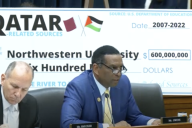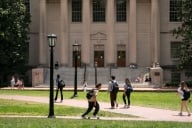You have /5 articles left.
Sign up for a free account or log in.
A professor has sued the University of Washington in federal court over a dispute over a land acknowledgment.
The professor, Stuart Reges, of the computer science department, in an act of protest, broke from the boilerplate land acknowledgment text that UW encourages—but does not require—professors to use as a suggested best practice. He wrote, “I acknowledge that by the labor theory of property the Coast Salish people can claim historical ownership of almost none of the land currently occupied by the University of Washington.”
The university responded to Reges by offering another section of the class he was teaching—Reges said about 30 percent of his students transferred to that course—and by amending his online syllabus to remove the controversial land acknowledgment.
The university has countered by noting there is no university policy requiring a land acknowledgment or specific text that is required to be used for land acknowledgments. UW argued that land acknowledgments are more about principles than politics.
“Commonly utilized land acknowledgements are not politicized statements about land claims or ownership nor expressions of personal viewpoints about land ownership, but are rather statements of fact—the purpose being to acknowledge that the university sits on the historical ancestral lands of the Coast Salish people,” UW spokesperson Victor Balta wrote in an email at the time.
The Foundation for Individual Rights and Expression is supporting Reges’s lawsuit.
“University administrators turned me into a pariah on campus because I included a land acknowledgment that wasn’t sufficiently progressive for them,” said Reges. “Land acknowledgments are performative acts of conformity that should be resisted, even if it lands you in court. I am pleased that FIRE joined with me to fight back against University of Washington’s illegal viewpoint discrimination.”








